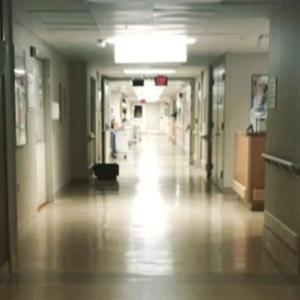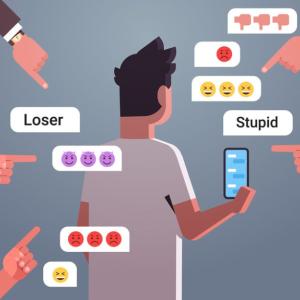Decades after it was declared eliminated, I fear the heartbreaking, avoidable consequences of measles
As a child, I remember the sadness in my grandmother’s voice as she told us that my eight-year-old cousin had been diagnosed with a “fatal brain disease.” Tears streamed down her face. “All we can do is pray for a miracle,” she said.
She was talking about my cousin Sriram, who lived in India and was three years older than me. He had always been a little bit naughty. On our visits from Canada, Sriram would tease me and make up stories about “poochandis” – the Tamil word for bogeyman – coming into my bedroom. We played endless games of hide and seek with our other cousins, and Sriram would know all the best places to hide and then jump out to scare me in the dark corners of the big, spooky communal house.
When we’d travelled to India six months before my grandmother broke her news, Sriram had changed. He seemed distant and was sometimes irritable. He had split-second staring episodes. He developed jerking movements and started to have seizures. He was getting bad grades and in India’s strict and rigid school system, he was beaten with a ruler and put in detention. His teachers thought he was just being insolent when he would not follow their instructions. All the adults in the family were worried about his grades dropping. There was tremendous pressure to keep up the academic pace, even though he was just eight.
About a year after his symptoms first appeared, Sriram was diagnosed with Subacute Sclerosing Pan-encephalitis (SSPE). His parents felt tremendous guilt for disciplining him so harshly when it became clear that his behaviour was caused by a devastating neurological disease.
My favourite uncle, a neurologist in India, secretly told me that my cousin would die from this and that it was because he had had measles a few years earlier. He told me that it was especially devastating because Sriram’s disease was totally preventable had he been vaccinated against measles. This unnecessary loss of life and needless grief and suffering inspired me to become a neurologist. I wanted to be just like my uncle and was fascinated by the brain even at that young age. I wanted to care for and cure neurological diseases that affect the inner core of what makes us human.
I have been haunted by the memory of Sriram. His death was the first of someone who was close to me. It affected me profoundly. even though he lived on the opposite side of the world. Sriram had been his parents’ only child; they had another child to replace him. We all catch a glimpse and are reminded of our lost cousin in the face of Bala, who lives in the shadow of the brother he never met.
Daniel Bonthius, a pediatric neurologist in Charlotte, N.C., says SSPE is “arguably the most interesting disease in mankind” because of its complex interplay among virus, host, immune system and age. SSPE occurs almost exclusively in infants who get measles before they’re two, but poses an even higher risk to babies who get measles before they’re one.
There is an asymptomatic period that can last as long as 27 years. The disease then emerges insidiously, often with changes in academic performance and behaviour, and progresses to jerky movements, seizures, blindness, dementia and eventually death within one to three years after symptoms appear.
SSPE is caused by a mutated, non-infectious form measles virus that persists and replicates in “astronomical” levels in the brains of patients who are unable to clear it. Diagnosis is confirmed by finding high levels of anti-measles antibodies in blood and cerebrospinal fluid. SSPE can occur in one in 609 unvaccinated infants under the age of 15 months.
As a medical student rotating on the wards of the Hospital for Sick Children in Toronto in 1995, I saw a case of SSPE in a child who had migrated from Afghanistan. The tiny nine-year-old girl was emaciated, having lost a lot of weight from seizures, and was being fed through a tube in her stomach. Despite a cocktail of three different medications, we could not control her seizures. I remember looking at the brain waves on the EEG machine that were continuously spiking in synchrony with her jerking body. It was another heartbreaking, avoidable tragedy.
I saw two more cases in my three years as a neurology resident at the University of California at Los Angeles, each case ravaging the child and the family.
The British author Roald Dahl, whose seven-year-old daughter died of SPPE just one year before the measles, mumps and rubella (MMR) vaccine was licensed in 1963, wrote a striking open letter in which he beseeched parents to take the opportunity that he never had and have their children vaccinated. I was so relieved as a senior resident when I heard the incredible news that measles was declared eliminated in 2000 due to successful MMR vaccine campaigns.
Now, 25 years later, measles cases are surging worldwide. At the time of writing, there have been more than 572 measles cases in Ontario; 102 were reported in just one week. There have been more cases reported in the past week than in the decade from 2013 to 2023.
According to the Centres for Disease Control website, 483 cases were reported in just the first three months of 2025, with 33 per cent occurring in children less than five years old in the United States. Ninety-seven per cent of these cases have been reported in people who haven’t been vaccinated. Outbreaks have been reported in Texas, New Mexico, Ohio and Kansas.
Globally, the top countries with measles outbreaks include Yemen, Pakistan, India and Thailand. Measles is so highly infectious that 95 per cent immunity is required to prevent epidemics, according to the World Health Organization.
Bonthius says fatal encephalitis “technically and biologically could be abolished as a human disease.” Yet, I fear the downstream consequences of what the anti-vaccine movement could bring.
---
Dr. Indu Subramanian is a Clinical Professor of Neurology. She received her medical degree from the University of Toronto, and did her neurology residency and Movement Disorders fellowship training at UCLA. Dr. Subramanian’s main research interest is on the effects of loneliness on people living with PD.
This article was originally published on Healthy Debate.









